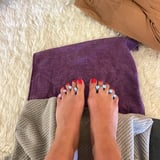
I love getting my nails done. Actually, let me rephrase that: I love what my nails look like when they're done, but I'm not a huge fan of the process. Whether it's a manicure or a pedicure, I always feel like my time at the nail salon is wasted because I'm stuck sitting somewhere for two-plus hours and I can't even use my hands. While I do normally find pedicures on their own to be more relaxing, after one too many late nights scrolling on TikTok, I've started to get a little nervous about whether or not regular pedicures are sanitary. Enter: waterless pedicures.
Waterless pedicures, which are sometimes called dry pedicures, are exactly what they sound like: pedicures without water. "It's a more sanitary way of receiving a pedicure because you're eliminating the tub where lots of other people have placed their feet," celebrity manicuristDeborah Lippman previously told PS. With waterless pedicures, you can eliminate the chance of cross-contamination between clients, you'll avoid contracting a water-borne infection, and you won't come into contact with any chemicals that are used to clean the tubs in between customers.
Not only that, but apparently, applying your nail polish to wet nails isn't great in terms of longevity. "Water is very damaging and drying to nails, which leads to polish chipping sooner," Lippman says. "The nail plate is porous and therefore, absorbs water while soaking, leading it to expand. If you apply polish to an expanded nail, the polish will not adhere as well and is likely to chip when the nail dries out and shrinks back to its normal state."
Learning all of this made me game to try out my first-ever waterless pedicure, and now that I've dipped my toe (no pun intended) in the dry pedi game, I don't think I'll ever look back. My pedicure was administered by celebrity nail artist Vanessa Sanchez McCullough, and it was one of the most luxurious nail experiences I've had - no tub of water required.
McCullough started by removing the old polish I had on my toenails and clipping my nails to the proper length. Then, she filed them down so they all looked even. From there, she took a buffing tool and began exfoliating my heels and the bottoms of my feet. Next, it was time to put on collagen socks. "We aren't using any water and I want to make sure you're getting moisturized," Sanchez McCullough says. They fit over both of my feet and were toeless so she could continue working on my nails.
While my feet were sitting in the collagen socks, Sanchez McCullough applied a cuticle remover and began removing any excess dead skin. She then trimmed my cuticles and went over my nails with a buffer. Next, she took off the collagen socks and used the leftover product to massage my feet and legs. She went over my toes one more time with nail polish remover to ensure there was no residue on them, and then she painted them using the CND Vinylux Nail Polish ($11) in the shade Wildfire. The Vinylux line doesn't require a base coat and is fast drying, but we still topped it off using the Vinylux Gel-Like Effect Top Coat ($8) and the CND SolarSpeed Spray ($10) so I could walk around ASAP after the treatment.
The entire process was just as luxurious as a regular pedicure, but honestly felt a lot better. I found that after the pedicure, my feet felt more moisturized than they typically do with regular pedicures because the prolonged time soaking in water dries my skin out. My polish looked better and more vibrant than it usually does, and the backs of my feet still felt hydrated.
Renee Rodriguez is a staff writer and social producer for PS. She writes across all verticals, but her main areas of expertise focus on fashion and beauty content with an emphasis on reviews and editor experiments. She also produces social content for the PS TikTok and Instagram accounts.
